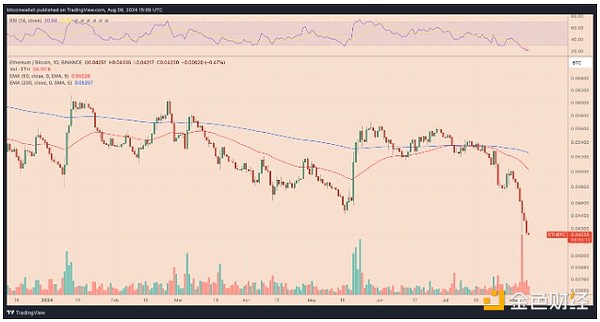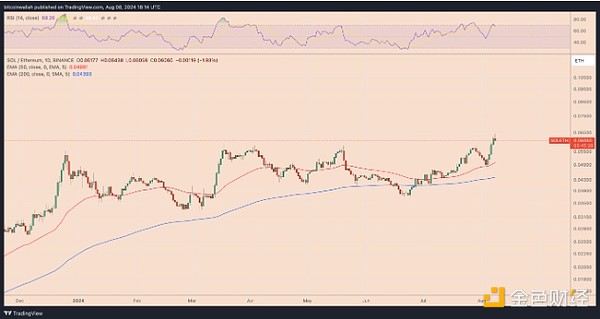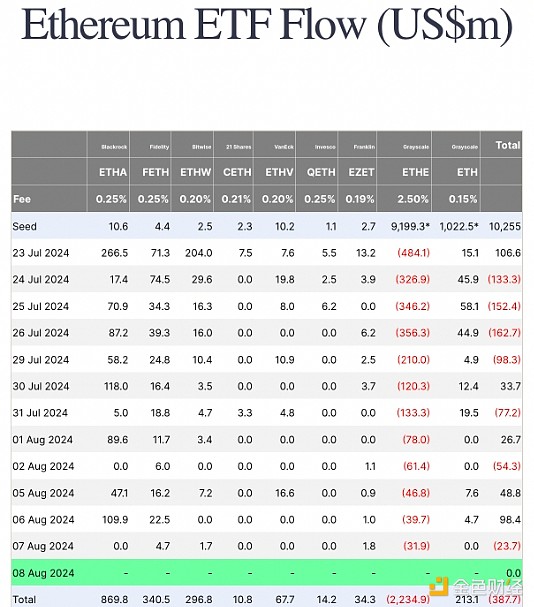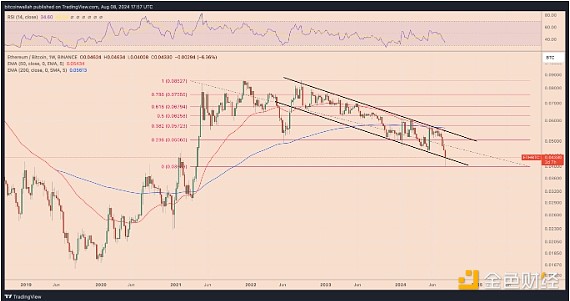Author: Yashu Gola, CoinTelegraph; Translated by: Deng Tong, Jinse Finance
Ethereum’s native token, Ether, fell to a three-year low against Bitcoin on August 5 amid global market turmoil. The sharp drop has caused ETH/BTC to lose 25% of its year-to-date returns.

ETH/BTC daily price chart. Source: TradingView
Although Ethereum spot exchange-traded funds (ETFs) have been launched in the U.S., they continue to underperform Bitcoin. This could be a catalyst to attract institutional capital into the Ethereum market, as many analysts predict.
SOL is beating Ether
Ethereum’s increasingly poor performance relative to Bitcoin is consistent with its declining dominance relative to its largest blockchain competitor, Solana and its SOL token.
Notably, the SOL/ETH pair has gained 10.75% in the past 24 hours, hitting a new high of 0.064 ETH on August 8. This surge coincided with the launch of the Brazilian spot Solana ETF.

SOL/ETH daily price chart. Source: TradingView
At the same time, it is part of a rally that began in June. Since then, the pair has rebounded by about 75%.
Ethereum ETF underperforms Bitcoin in debut
The much-anticipated launch of a spot Ethereum ETF in the U.S. has received a surprisingly muted response from investors. According to data from Farside Investors, the investment vehicles have seen $387.7 million in outflows since they went live on July 23.

Ethereum ETF flows. Source: Farside Investors
In contrast, the Bitcoin ETF saw positive net inflows in the first two weeks after its launch on January 11.
Bitcoin is primarily viewed as a “store of value.” Ethereum, on the other hand, is viewed as a platform for decentralized applications and smart contracts. This fundamental difference could affect the preferences of traditional investors.
For example, according to Coingecko, only six public companies hold Ethereum as a reserve asset, compared to 29 companies that hold Bitcoin.
Ethereum enters a descending channel
From a technical perspective, Ethereum’s decline against Bitcoin is part of a downtrend that has been in place since September 2022 within its prevailing descending channel.
In May 2024, ETH/BTC tested the channel’s uptrend line, around 0.056 BTC, and has since retraced as much as 30%. Interestingly, the same uptrend line coincides with two other resistance levels, namely the 50-week (red) and 200-week (blue) exponential moving averages (EMAs).

ETH/BTC weekly price chart. Source: TradingView
Nonetheless, as of August, Ethereum is still testing the channel’s descending trendline in search of a rebound, with a potential upside target of around 0.050 BTC. This level coincides with the 0.236 Fibonacci Retracement level for ETH/BTC.
The likelihood of a rebound further increases as Ethereum’s weekly relative strength index (RSI) reading is 34.60, just over 4 pips away from its oversold threshold level. An oversold RSI usually precedes a rally or consolidation period.








